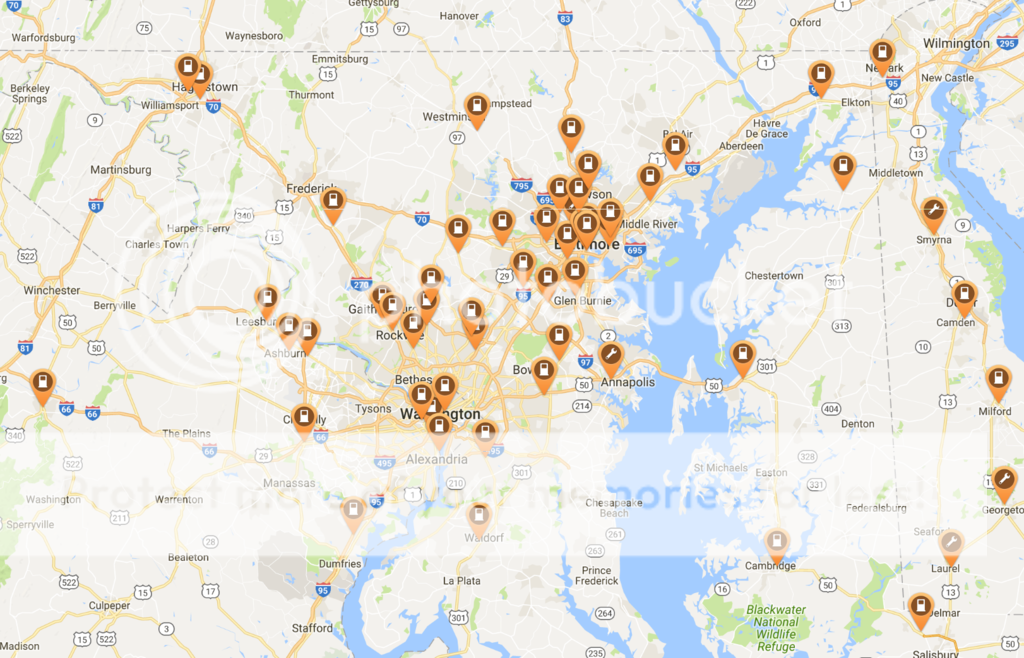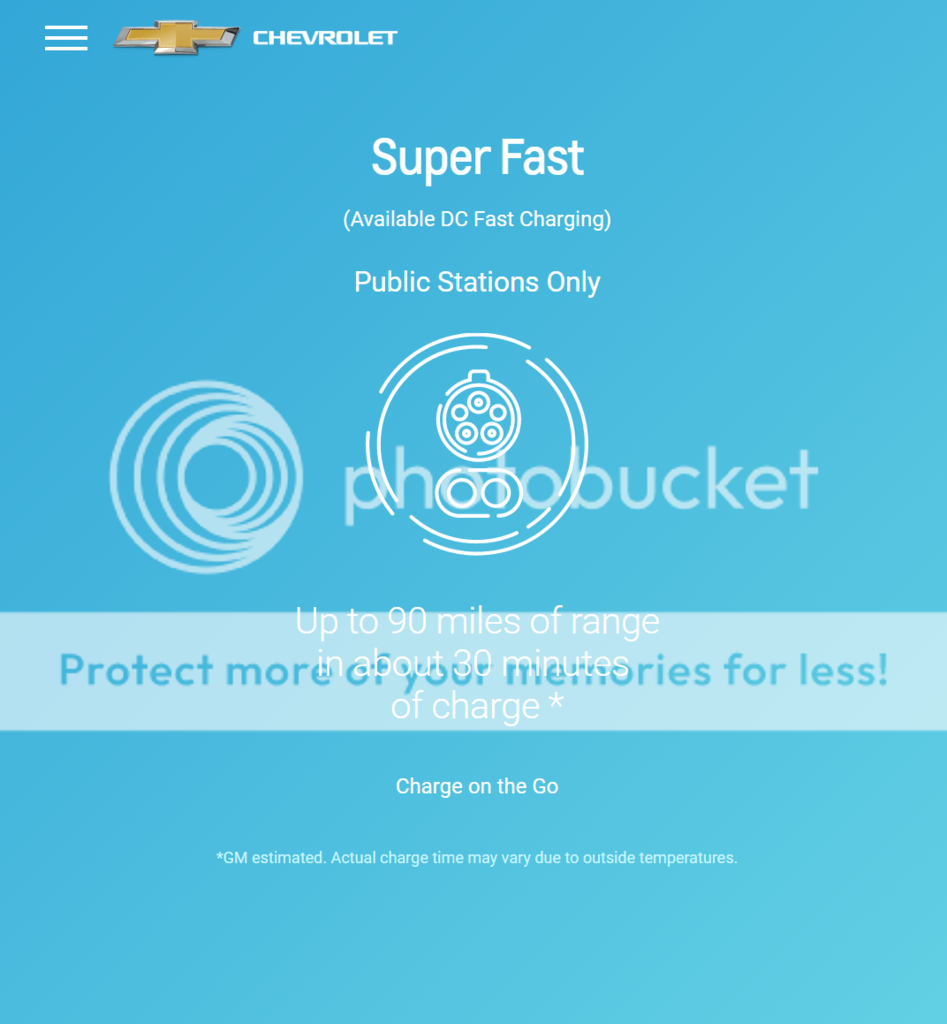So after almost 2 months over ownership and 2,000 miles on the road, I've also managed to use CCS DCFC fast charging stations several times (once out of necessity, the other times purely for testing purposes). What I've found is that, like with EV range, your mileage will vary when fast charging the Bolt....literally.
The Bolt is outfitted with a SAE Combo Charging System (CCS) charging port, so it can only fast charge at locations with CCS plugs. It cannot use CHAdeMO plugs that Japanese vehicles such as the Leaf can use. While CHAdeMO stations vastly outnumbered CCS-compatible stations a few years ago, the gap is closing as the number of CCS fast charging stations is increasing every day. Most new non-Tesla DC fast charging stations have both CHAdeMO and CCS plugs.
In my area (Howard County, MD) there is a fairly decent CCS-compatible fast charging network. There are over 60 CCS stations within 100 miles of where I live, so I can pretty much drive anywhere in Maryland without having to worry about range. Hell, the Bolt's 238 (more like 190-200 miles in sub-freezing temperatures) mile EPA range is usually more than enough for my family without even factoring in fast charging capability!
 |
| Not too shabby a network! |
While there are several companies that offer fast charging stations, the main 2 in my area (and pretty much across the country) are Chargepoint and EVgo. Both currently have fast charging stations that advertise 50 kW charging rates. As we will see a little later, 50 kW advertised does not equal 50 kW observed in real-life charging. The Chargepoint stations in my area (mostly installed at Royal Farms locations) cost 29 cents/kWh, with a $3.50 minimum charge. EVgo charging prices vary by the plan you choose, but the best plan for people charging multiple times a month is its "On The Go" plan, which costs a flat $14.95/month and 10 cents/min while fast charging. Again, these are Maryland rates, so if you live in another region the pricing will vary.
While GM has been coy with the 2017 Bolt's exact fast charging capabilities, it has stated that the Bolt can achieve "about 90 miles in 30 minutes", presumably based off the official 238 EPA-rated range. There is some fine print stating charging performance is dependent on factors such as ambient temperatures.
 |
| 90 miles in 30 minutes *HUGE ASTERISK* |
Having experienced at least 6 separate instances of fast charging at various Chargepoint and EVgo stations in my area, here are my findings:
- No one will actually see 50 kW charge rates at a 50 kW fast charging station with a Bolt...at least not a a station rated at a maximum 125 amps. 46 kW has been the fastest rate I have observed. I DO believe the Bolt can charge faster than 50 kW if hooked up to a fast charging station rated higher than 50 kW/125 amps. Too bad none exist yet that are available to the public.
- The Bolt's battery is pretty sensitive to temperatures when it comes to fast charging. With data logged by my OBDII reader and Torque Pro app, I've noticed that I don't experience max (125 amps) charge rates until the Bolt's HV battery temperature is between 65-70 degrees F. If you are planning on fast charging first thing in the morning after parking your Bolt outside in sub-freezing weather unplugged, you will likely experience throttled charge rates till the battery comes up to temp.
- The Bolt tapers the max charge rate fairly early compared to say the Spark EV. While Spark EV owners reported near 50 kW rates from 0% to almost 80% SOC, I've noticed the Bolt starts tapering rates at around 50% SOC (ramps down to ~38kW/~100 amps) and again at 70% (down to ~24 kW/~60 amps) from peak ~46 kW/125 amp charge rates at a 125A station. At a little over 80%, the rate again tapers down to <20 kW and stays there till fully charged.
- The ~0-50% SOC window is where you will see the Bolt charge at the advertised "about 90 miles in about 30 minutes" rates, assuming the HV battery is up to temperature. In the spring/summer/fall, battery temps shouldn't be an issue, but in winter areas that routinely see sub-freezing temperatures, this is something to be aware of.
- The most I ever saw in a 30 minute session was 21.84 kWh charged at a 125A EVgo station. Translated in EPA-rated miles, that's ~87 miles in 30 minutes. Slight throttling was experienced.
The below chart might be an info overload, but you can see that the max charge rates (125A/46 kW) aren't realized until the HV battery temp reaches around 70F.
And the charging figures:
Session start time: 5:27AM
HV battery SOC% (SOC-R value in Torque Pro): 9.02%
Battery SOC% according to the station: 5%
HV battery temp: 60.8F
Ambient temp: 57F
Session end time: 6:08AM
HV battery SOC% (SOC-R value in Torque Pro): 50.2%
Battery SOC% according to the station: 47%
HV battery temp: 77F
Ambient temp: 57F
Total kWh charged: 26.73 kWh (according to Torque Pro) / 27.6 according station
Total time charging: 39 minutes (2 minute gap when stopping/restarting charging)
Total SOC% gained: 41% (according to Torque Pro) / 42% according to station
Max charge rate observed according to car: 46 kW
Once a >125amp CCS station is online, I am eager to see just how much power the Bolt can suck in! If amperage exceeds 131A, a guy I know owes me 100 bucks. 😎
Session start time: 5:27AM
HV battery SOC% (SOC-R value in Torque Pro): 9.02%
Battery SOC% according to the station: 5%
HV battery temp: 60.8F
Ambient temp: 57F
Session end time: 6:08AM
HV battery SOC% (SOC-R value in Torque Pro): 50.2%
Battery SOC% according to the station: 47%
HV battery temp: 77F
Ambient temp: 57F
Total kWh charged: 26.73 kWh (according to Torque Pro) / 27.6 according station
Total time charging: 39 minutes (2 minute gap when stopping/restarting charging)
Total SOC% gained: 41% (according to Torque Pro) / 42% according to station
Max charge rate observed according to car: 46 kW
Once a >125amp CCS station is online, I am eager to see just how much power the Bolt can suck in! If amperage exceeds 131A, a guy I know owes me 100 bucks. 😎
